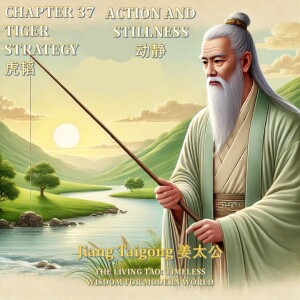

THE LIVING TAO : TIMELESS WISDOM FOR THE MODERN WORLD
The Art of War by Master Taigong Chapter 37 Tiger Strategy - Action and Stillness
2024-12-07
King Wu of ancient China consults Jiang Taigong, a military strategist, on how to defeat an equally matched enemy army. Jiang Taigong proposes two strategies: a first involving flanking maneuvers and overwhelming displays of force to induce fear and disarray, and a second employing feigned retreats and ambushes to exploit enemy vulnerabilities. Both strategies emphasize psychological warfare to create chaos within the enemy ranks and secure victory. The dialogue highlights the importance of...
King Wu of ancient China consults Jiang Taigong, a military strategist, on how to defeat an equally matched enemy army. Jiang Taigong proposes two strategies: a first involving flanking maneuvers and overwhelming displays of force to induce fear and disarray, and a second employing feigned retreats and ambushes to exploit enemy vulnerabilities. Both strategies emphasize psychological warfare to create chaos within the enemy ranks and secure victory. The dialogue highlights the importance of adaptability in military planning and the need to consider the terrain and the enemy's anticipation of one's plans. King Wu ultimately approves of both strategic approaches.
Comments (3)
More Episodes
All Episodes>>Creat Yourt Podcast In Minutes
- Full-featured podcast site
- Unlimited storage and bandwidth
- Comprehensive podcast stats
- Distribute to Apple Podcasts, Spotify, and more
- Make money with your podcast
It is Free












